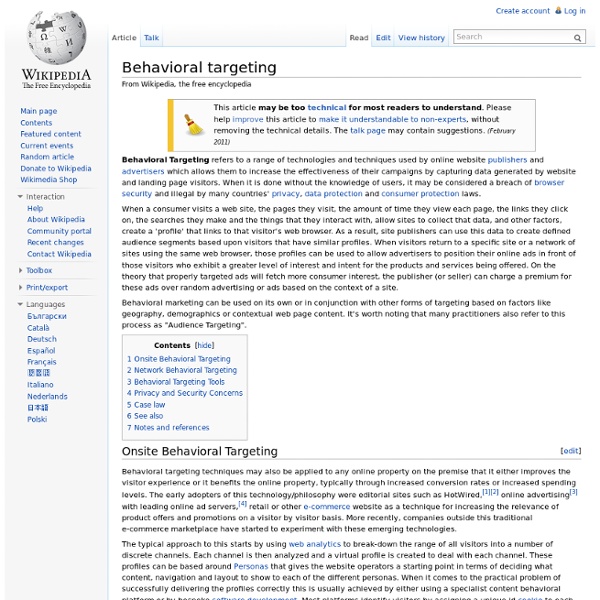Web bugs
A web bug is an object that is embedded in a web page or email and is usually invisible to the user but allows checking that a user has viewed the page or email.[1] Common uses are email tracking and page tagging for web analytics. Alternative names are web beacon, tracking bug, tag, or page tag. Common names for web bugs implemented through an embedded image include tracking pixel, pixel tag, 1×1 gif, and clear gif.[2] When implemented using JavaScript, they may be called JavaScript tags. Web bugging is analogous to conventional bugging, but is not as invasive or intrusive. The term should not be confused with the more benign web spider nor more malicious computer worms. Overview[edit] A web bug is any of a number of techniques used to track who is reading a web page or email, when, and from which computer. On web pages[edit] Web bugs are typically used by third parties to monitor the activity of customers at a site.[3] Tracking on web pages can be disabled using a number of techniques.
Regulation of Behavioral Advertising
The targeted Internet advertising phenomenon is viewed with growing concern by privacy advocates who fear that controversial practices like behavioral tracking are ripe for abuse. A coalition of consumer and Internet rights groups have written a joint open letter addressed to the House Committee on Energy and Commerce in which they articulate some specific concerns about behavioral tracking and provide an outline of proposed regulatory guidelines that they believe should be enforced to protect consumers. Behavioral tracking, a practice that is used by all of the major Internet advertising networks, involves building a profile of information about users based on which websites they visit. Although behavioral tracking increases ad value and helps pay for the rich ecosystem of free content and services that users enjoy on the Internet, it raises serious privacy concerns.
eXelate Preferences Manager
eXelate believes that consumer control is key to delivering a great browsing experience. The data shown represents the information gathered based on the activity of this computer – not an individual user. This page is designed to give you, the consumer, transparency into the information marketers have discovered about your interests through eXelate’s service. To get a snapshot of what our marketing partners have defined as your interests, simply review the sections below. By updating the information below, you will be opting in or out of receiving specific types of targeted ads. If you prefer to have an untargeted ad experience while you surf, simply click the “Opt Out” button and all of your preferences will be cleared. No additional informational cookies will be delivered to you from eXelate. For more information, review the opt-out tool from the Network Advertising Initiative at:
Privacy Matters
For as long as there’s been advertising, advertisers have aimed to target their ads to the right audience. targeting Beer ads during football games, cosmetics in women's magazines, trailers for coming attractions in the theaters — these are all examples of advertisers targeting products and services to what they hope is the most suitable audience.Internet technology has since created new and sophisticated ways to target “the right message to the right person at the right time.”Today cookies are the tools that give advertisers insight. Before you worry about loss of privacy, remember that you have the choice to turn off targeting practices filtering cookies with your browser or opt out at Advertisers target ads by gauging the content you show interest in—including the sites you visit and the ads you click. examples how it works Location, location, location. Getting to know you. As you surf.
Self-Regulatory Principles for OB Advertising
The cross-industry Self-Regulatory Program for Online Behavioral Advertising was developed by leading industry associations to apply consumer-friendly standards to online behavioral advertising across the Internet. Online behavioral advertising increasingly supports the convenient access to content, services, and applications over the Internet that consumers have come to expect at no cost to them. The Self-Regulatory Program is based on the seven Self-Regulatory Principles for Online Behavioral Advertising released in July 2009. The Education Principle calls for organizations to participate in efforts to educate individuals and businesses about online behavioral advertising and the Principles. The Transparency Principle calls for clearer and easily accessible disclosures to consumers about data collection and use practices associated with online behavioral advertising. You can download the complete Self-Regulatory Principles for Online Behavioral Advertising Implementation Guidance
Digital Advertising Alliance
The Digital Advertising Alliance (DAA) is a consortium of the leading national advertising and marketing trade groups who together deliver effective, self-regulatory solutions to online consumer issues. Participating associations include: About the Participating Associations The 4A's is the national trade association of the advertising agency business. The American Advertising Federation, headquartered in Washington, D.C., acts as the "Unifying Voice for Advertising." The Association of National Advertisers leads the marketing community by providing its members insights, collaboration and advocacy. As the leader in advancing marketplace trust, Better Business Bureau is an unbiased non-profit organization that sets and upholds high standards for fair and honest business behavior. The Direct Marketing Association (DMA) is the leading global trade association of businesses and nonprofit organizations using and supporting multichannel direct marketing tools and techniques.
The Network Advertising Initiative



